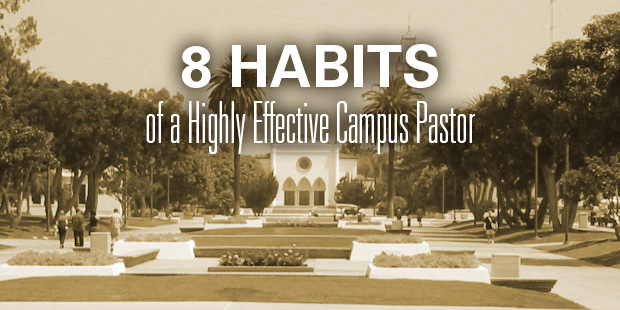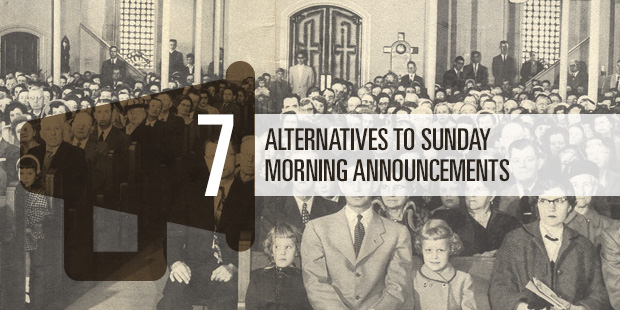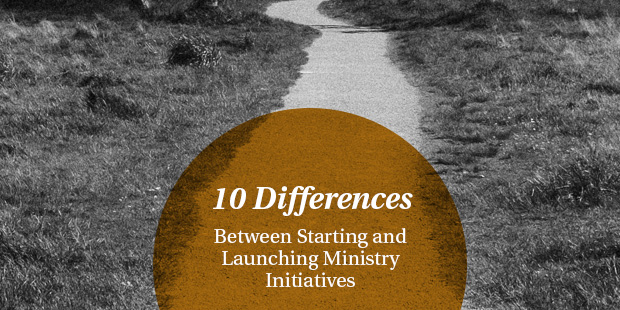One of our roles as church leaders is to have our pulse on the shifting cultural around us so we can serve our community better. We need understand the times so we can have clarity on what actions we should be taking as a church. Below are some “signs of the times” and some quick thoughts on what impact I believe these will have on us in the coming years.
>> Your community is more culturally diverse than it has ever been.

There are more people who don’t “look like you” than ever before. Our churches need to learn how to move beyond trying to reach one monolithic stereotype cultural group and figure out how to ensure our ministries can reach a wide variety of cultures. Still doubt this reality?“Minority babies” are now “majority” in our culture. Some impacts of this shifting reality in your church might be:
- Spanish Translation // What are you doing to make your services available in spanish?
- Leadership Makeup // When was the last time you asked why your staff doesn’t reflect the community you are trying to reach?
- Music & Parties // There isn’t one type of musical expression or celebration that is enjoyed in your community anymore … what does that mean for your services?
>> People are getting older.

The Baby Boomers have defined so many cultural trends of the last 100 years and they are just starting to define “retirement” and “the older years”. Life expectancy is set to continue to rise for the next 20-30 years to point where a larger percentage of the population will be living past 80 years of age than ever before. Some potential impacts of this trend might be …
- Boomer Pastors // All those boomer pastors that now in their 60s … might very well be serving well into their 70s. What impact will that have on passing leadership to the next generation?
- Half Time // People will be looking at the “second half” of their lives and wondering how they can move from success to significance. How can the church provide a place for these leaders looking to invest their abilities into reaching the next generation?
- Senior Targeted Churches? // When is someone going to come out and launch a church targeted at people over 60 and their families?
>> Marrying Older, But Sooner?
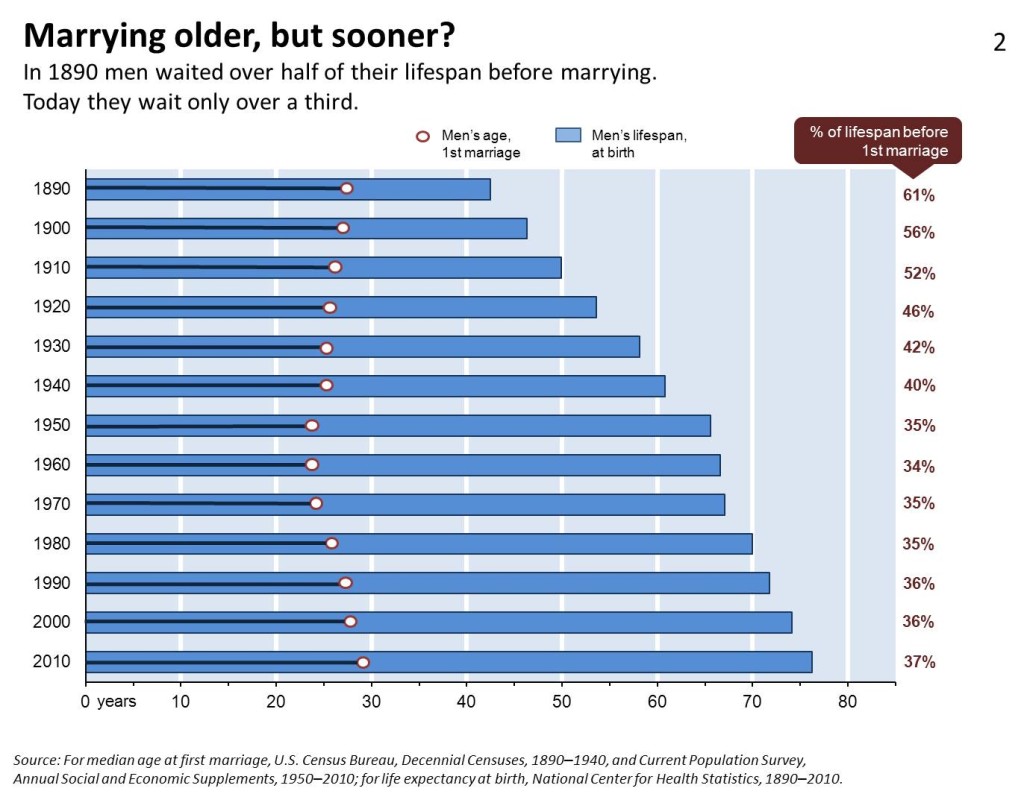
If you have been involved in helping people get married you’ve noticed that median age of people getting married has risen over time. This is somewhat true … In reality the trend was that in the 50s & 60s people where getting married at a younger age than was typical. Even more intriguing to me is that as life expectancy has grown longer and longer the percentage of their lives that they are married has grown significantly. Almost 3x what it was 100 years ago! [Click here to see the female version of the above chart.] Some impacts of this trend might be …
- What are young adults? // Some ministries go pretty negative on the “non-married” young people attending their church … labeling this period between the end of college and marriage as a “second adolescence”. Our churches need to embrace this reality and not alienate this group from our church!
- Release This People! // Paul was pretty clear in 1 Corinthians 7 that there are some distinct advantages for the gospel to not being married. How can we cast vision for this group to leverage this unique time for the mission of Jesus?
- New Pressures? // People are married for a long time … “until death do us part” means 3x as long as it did for people 100 years ago. What pressures does this place on marriages that didn’t exist back then?
>> We’re not delaying having kids.

In the late 1980s a new cultural trend took hold that has continued until today … as a culture we started having babies before we were married. Today, almost half of all babies are born to unmarried mothers, and the median first birth happens around one year earlier in a woman’s life than her median age of first marriage. Some questions this trend has generated in me are:
- Where are the single moms? // Why aren’t there more single moms in my church? What does that say about our ability to reach the community?
- What is “Family Ministry”? // Parenthood has changed. Have our assumptions to what “family ministry” is changed?
- How can we support? // We know that kids born into a strong social network have a better shot at life. Marriage provides one of those social networks … since that is a fraying institution how does the church need to step in and support these families?
>> Our community is more politically divided.
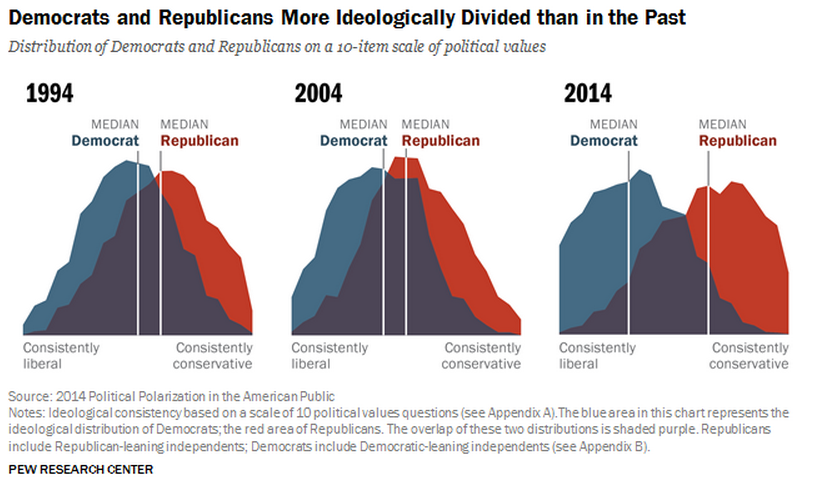
Okay … before you jump all over me to fusing politics and church life … I believe that politics is just one way to get a sense of what is happening in the broader culture. I’m not making a values judgement on this divide … but the reality is that there is a growing gulf between the “left” and the “right” in our communities. As an example … Tony Campolo hasn’t changed his political views but in the last few years he’s caught flack from the “Christian right” on a regular basis. (I remember as a young person our church showing a Tony Campolo film at our evening service … I’m not sure that same church would do that today.) For my Canadian friends … Would former Baptist Pastor, Tommy Douglas be welcomed in your church today? Some questions on this polarization for church leaders:
- Withdraw to the Mountains? // “When Jesus saw that they were ready to force him to be their king, he slipped away into the hills by himself.” –John 6:15
- A Faith of Our Own // One of the clearest thinkers on this topic I’ve run into is Jonathan Merrit. Read his book … or watch this video of him at our church a few years ago. What do you think about what he’s saying?
- Fox News Faith? // We all have political leanings as church leaders.Admit it. How do your political views shape your leadership and view of the world around you? Lead from a self aware point of view. Jesus rejected political answers to conditions of the heart … so should we.
>> Welcome to the Age of the Nones.
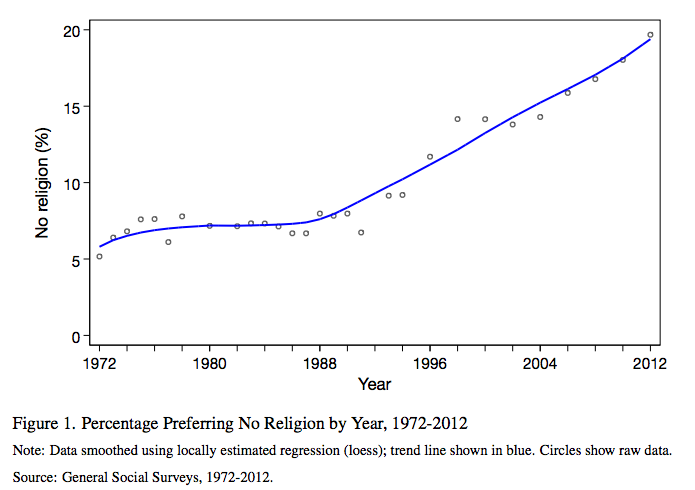
It’s official … the fastest growing religious group in our culture are people who identify their religious affiliation as “none”. The acceleration rate of people identifying themselves in this category is breath taking. In the coming years you will increasingly bump into people who don’t identify themselves as having any “faith tradition” at all. Some potential issues for church leaders to think about on this are …
- Cool Alternatives Aren’t Enough // Offering a church service that is “better” than what people experienced when they were kids (and last attended church) isn’t enough to reach “nones”. Put it this way … if you’ve never been (and aren’t interested in) horseback riding the fact that there is a really cool stable in your town means nothing to you … you’re never going to check it out. We have to start our conversation with people in a totally different manner.
- Huge Opportunity // I see this as a massive evangelism and discipleship opportunity. The idea of not having to “unprogram” people negative past approaches to faith is exciting.
- Learn From Others // We need to stop looking to the south to learn from churches reaching people in communities with less “nones” than in the rest of the country. We should be looking to Canada, Europe and other cultures to find churches reaching those communities with the message of Jesus despite this cultural reality.
>> People are More Educated

People have more formal post-secondary education than ever before. On top of this people have wide spread access to information at their finger tips really for the first time in history. At one point in history church leaders where amongst the most educated people in a community but that just isn’t the case anymore. [As a side note … females are far more educated than males in our culture. What does that do to your cultural understanding of 1 Timothy 2?] Here are some impacts this trend might have on your church:
- 3 Points & Joke Doesn’t Work Anymore // You can’t just wing your messages on the weekend. Sermons need to be rigorously prepared and assume people have a level of education that whoever taught you about preaching didn’t assume.
- Work With the Internet // In a world where people have access to unlimited knowledge we need wisdom even more! Help people learn how to learn not just what they need to know.
- Present Different Points of View // The Kingdom of God is a rich and diverse community with people that have very different theological points of view. Be okay with that. Educated people know that not everyone shares the same point of view as them … and they are okay with that. Don’t be so dogmatic with your gray area theological intricacies. It turns educated people off.
>> People Drive Less

Stay with me for this last one … as a kid who grew up with a dad who worked in the automotive industry I’ve seen the impact that the car has had on our culture. In some ways … the history of the last one hundred years can be seen as a story that the car has had on our culture. Something has shifted in the last few years where people are driving less than they used to. (Gas prices, home offices, cocooning, etc.) This is bound to have an impact on our churches …
- Average Drive Time // The “church growth movement” was largely driven be “destination churches” where people would drove past their local parish and drive to a church that met their needs more. People are going to be less likely to drive long distances to come to your church. This reality is driving the growth of the multisite church movement today.
- Your Actual Neighbors // How are we reaching people who are within a reasonable walking (or biking?) distance of our church buildings? Do we need to double down on that? Maybe the parish wasn’t such a bad idea after all …
- House Churches // This reality will drive the growth of people meeting in homes to have a fully functional “church” experience … rather than driving to some religious building. How is your church leveraging that opportunity?
What trends do you see happening the broader culture that are impacting your church?
Read more from Rich here.

Tags: Change leadership, Cultural Change, Rich Birch
|
What is MyVisionRoom? > | Back to Leadership >



























